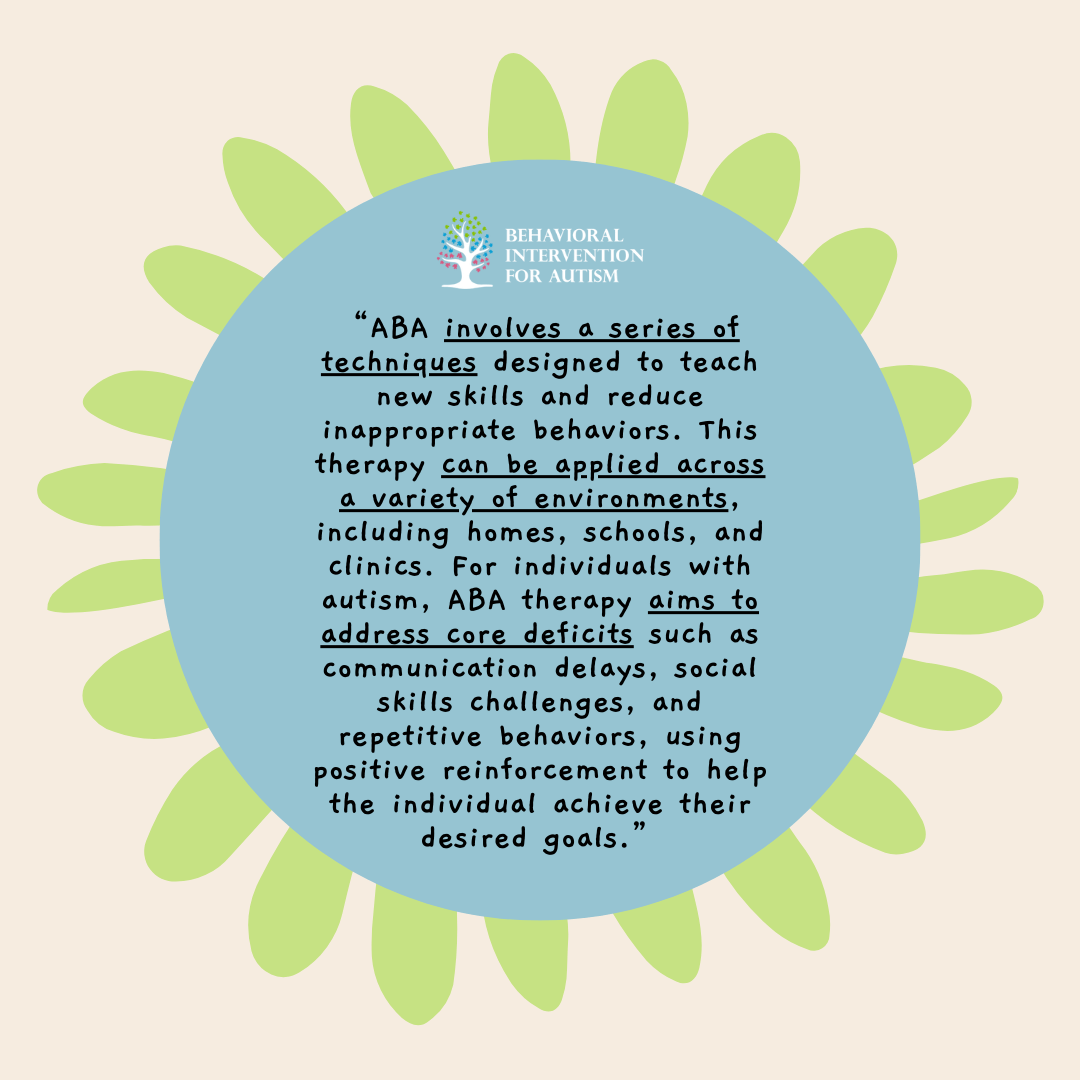
Table of Contents
Applied Behavior Analysis (ABA) therapy has emerged as one of the most effective and widely utilized therapies for individuals with autism spectrum disorder (ASD). Over the years, ABA has gained prominence due to its scientific foundation, evidence-based methods, and its proven success in improving various aspects of behavior and development.
ABA therapy works by focusing on understanding and changing specific behaviors while teaching important life skills. Through structured interventions and personalized plans, it helps individuals develop better communication, social, and adaptive skills, ultimately enhancing their ability to participate in daily activities. For individuals with ASD, ABA therapy offers a structured approach that enables them to reach their full potential, making it a crucial intervention. In this article, we will delve deeper into why ABA therapy is important and how it positively impacts the lives of individuals with autism.
What Is ABA Therapy?
ABA therapy is a structured and systematic approach to teaching skills and improving behaviors by reinforcing desirable actions and reducing problematic behaviors. The foundation of ABA therapy is based on the principles of behaviorism, which states that all behaviors are learned through interactions with the environment and can be modified using reinforcement and consequences.

There are two types of ABA interventions: Natural Environment Teaching (NET) and Discrete Trial Training (DTT). DTT focuses on breaking skills into smaller, manageable tasks, and teaching them systematically, while NET encourages learning in a more natural and less structured setting, fostering social interactions. Both approaches are effective in different contexts and are commonly used in therapy to target a range of skills.
The 4 Key Benefits of ABA Therapy
To fully appreciate the impact of ABA therapy, it’s important to understand the key benefits it offers to individuals with autism. These benefits go beyond improving behavior—they touch on various aspects of daily life, from communication to social interactions and independence. Below, we’ll explore the main advantages of ABA therapy and how it can significantly enhance the lives of individuals with autism.
1. Improved Communication Skills
For individuals with autism, communication can be a significant challenge. ABA therapy helps develop essential verbal and non-verbal communication skills. Through techniques like prompting, modeling, and reinforcement, ABA therapists can teach individuals how to express their needs, desires, and emotions in an appropriate manner. Whether it’s teaching sign language, increasing verbal communication, or enhancing social cues, ABA therapy fosters greater communication independence, allowing individuals to better interact with the world around them.
2. Enhanced Social Skills
One of the key goals of ABA therapy is to improve social interactions. ABA targets specific behaviors related to socialization, such as making eye contact, taking turns in conversations, and responding to others’ emotions. With these improvements, individuals with autism can engage in more meaningful relationships with peers, family members, and others, promoting a sense of belonging and enhancing their quality of life.
3. Reduction of Challenging Behaviors
Individuals with autism may display challenging behaviors such as aggression, self-injury, or tantrums, which can disrupt their daily activities. ABA therapy focuses on understanding the function of these behaviors and replacing them with more appropriate alternatives. By systematically reinforcing positive behaviors and using strategies like functional communication training, ABA therapy significantly reduces problem behaviors, ensuring a more harmonious environment for both the individual and their caregivers.
4. Increased Independence
ABA therapy empowers individuals with autism to perform tasks and activities independently. This may include learning essential life skills such as dressing, toileting, eating, or grooming. Through reinforcement, individuals are motivated to develop these skills, which greatly enhances their sense of independence and confidence. As they become more capable of handling daily tasks on their own, they are better equipped to navigate the world and contribute to their communities.
Why ABA Therapy is Crucial for Children with Autism
Introducing ABA therapy to children with autism is a vital step in supporting their growth and development. Through structured and evidence-based techniques, ABA therapy offers numerous advantages that can have a lasting impact. Below are some key reasons why ABA therapy is crucial for children with autism:
Early Intervention
Early intervention is crucial for children with autism, and ABA therapy has proven to be especially beneficial when implemented at a young age. Studies have shown that children who begin ABA therapy early in life tend to make greater progress in developing skills compared to those who start therapy later. This is because young children’s brains are more adaptable and responsive to learning, making early therapy a key factor in achieving long-term success.
Individualized Programs
One of the most important aspects of ABA therapy is its ability to create individualized programs tailored to the unique needs and abilities of each child. Every child with autism has different strengths, challenges, and learning styles, which is why ABA therapists assess the individual’s specific needs and create a personalized intervention plan. By addressing the child’s unique challenges and reinforcing their strengths, ABA therapy maximizes their potential and promotes progress in multiple areas of development.
Long-Term Benefits
The benefits of ABA therapy extend far beyond childhood. ABA teaches individuals skills that will serve them throughout their lives. Children who undergo ABA therapy typically experience improved social, academic, and vocational outcomes as they grow into adulthood. Furthermore, ABA therapy equips parents, teachers, and caregivers with the tools and techniques to support the child’s ongoing development, ensuring that the skills learned in therapy continue to be applied in various environments.
ABA Therapy for Adults with Autism
While ABA therapy is widely known for its success with children, it is also beneficial for adults with autism. Many adults with ASD face ongoing challenges related to social interactions, employment, and independent living. ABA therapy can help adults develop new skills or reinforce existing ones to increase their independence and improve their quality of life.
For adults, ABA therapy can focus on areas such as job skills, problem-solving, social communication, and emotional regulation. With the guidance of an ABA therapist, adults with autism can learn how to navigate the complexities of adult life, from managing relationships to making decisions in the workplace.
Additionally, ABA therapy for adults often involves a more collaborative approach, working alongside family members, employers, and support systems to ensure success. This allows individuals to build meaningful connections, participate in their communities, and achieve their personal goals.
ABA Therapy and Family Involvement
ABA therapy not only benefits individuals with autism but also has a profound impact on families. Through active involvement in the therapy process, family members gain a deeper understanding of autism and learn how to effectively support their loved ones. Parents, siblings, and caregivers are trained to implement ABA techniques at home, helping to maintain progress and consistency in everyday life.
By engaging in the therapy process, family members also strengthen their relationships with the individual. As they collaborate with ABA therapists, families can create a nurturing, supportive environment that fosters continued growth and development. In many cases, family members see improvements in communication, behavior, and overall quality of life, as ABA therapy provides them with the tools to better address the unique needs of their loved ones.
ABA Therapy and its Role in Inclusive Education
ABA therapy plays a vital role in creating inclusive educational environments for students with autism. Many schools and educational programs integrate ABA techniques into their teaching strategies to support students with autism in achieving academic and social success. ABA can be used to address a range of educational challenges, such as focus, attention, task completion, and communication within the classroom setting.
Through one-on-one sessions or group interventions, ABA therapy can help students improve their academic performance, foster positive interactions with peers, and enhance social participation. By incorporating ABA strategies, schools can create a more inclusive and supportive learning environment that allows students with autism to thrive alongside their neurotypical peers.
ABA therapy is an indispensable tool for individuals with autism, offering life-changing benefits that extend across various aspects of their development. From improving communication and social skills to fostering greater independence and reducing challenging behaviors, ABA therapy has proven to be a transformative intervention for both children and adults with autism. By providing individualized, evidence-based treatment, ABA helps individuals reach their full potential and navigate the complexities of daily life.
Take the First Step Towards Positive Change
If you’re looking for effective support for your child, ABA therapy in Florida is a proven approach that can make a significant difference. By choosing us, you can expect personalized therapy plans designed to meet your child’s unique needs. Behavioral Intervention For Autism is committed to delivering high-quality services that focus on fostering skill development and promoting independence. We provide compassionate care and tailor each session to ensure the best possible outcomes. Don’t wait to see the improvement in your child’s life—reach out to us today and discover the lasting benefits of ABA therapy.
- 9 Common Obsessions of Children With Autism You Should Know - February 25, 2025
- What is Neurodiversity? A Guide to Embracing Differences - February 25, 2025
- Understanding Hyperfocus in Autism: What It Means and Why It Happens - February 25, 2025

